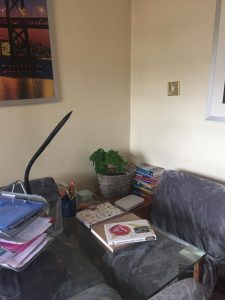As you know, I am an author. I write children’s books and I’m working on my children’s magical fantasy novel called Tredicino right now. I also blog. I also tutor and teach. I take care of a family, complete with dog. So, as you can see, I do a lot of things besides write. And sometimes, it’s overwhelming. There are always emergencies, things that need doing, people coming to visit, clients to talk to, business associates to meet, laundry to do (you get the idea), so that a task like writing always gets pushed to later, or usually tomorrow.
So I thought I’d share with you some of the ways in which I, and other writers, make time and get inspiration to write, not to mention deal with the dreaded writer’s block.
- Find time to write
 This may sound obvious, but it’s not as easy as it sounds. By finding time to write, I mean making time in your schedule by prioritising writing, yes. But it also means knowing yourself enough to know what the best time during the day is, for you to write. For example, I am a night owl. Well, I also have to be a morning person, due to all the things I need to do around the house, which means I don’t get as much sleep as I should. But being a night owl means that my energy and creativity are much better at night than in the morning. Which is why I tend to write after everyone is in bed. No matter how tired I am, the few hours before bedtime I write notes in my notebook, which I then transfer to my laptop later. I am a pen and paper girl. If I know I am going out for a dinner, for example, I do at least some of my work before I leave, and manage to look over it and edit it before bed, no matter how tired I am.
This may sound obvious, but it’s not as easy as it sounds. By finding time to write, I mean making time in your schedule by prioritising writing, yes. But it also means knowing yourself enough to know what the best time during the day is, for you to write. For example, I am a night owl. Well, I also have to be a morning person, due to all the things I need to do around the house, which means I don’t get as much sleep as I should. But being a night owl means that my energy and creativity are much better at night than in the morning. Which is why I tend to write after everyone is in bed. No matter how tired I am, the few hours before bedtime I write notes in my notebook, which I then transfer to my laptop later. I am a pen and paper girl. If I know I am going out for a dinner, for example, I do at least some of my work before I leave, and manage to look over it and edit it before bed, no matter how tired I am.
- Write every day
 The previous point leads nicely into this one – write something every day. Most professional authors will tell you that this is something that they definitely do. Writing professionally, or even semi-professionally, means that it’s a job. A job is something that you show up for every day and work at, no matter whether you feel like it or not. It’s harder to do this at home for sure. But like many writers, I basically tie myself to a chair and make sure I don’t get up from it until I have a few thousand words under my belt. If a do-not-disturb sign on the door will help, do that. And of course, like the previous point said, find a time when you will be least distracted. But write every day. No matter what, no matter how you feel like it. If it means you miss some social appointments, then so be it. People who work a regular job have to say no to a lot of outings. You get the same privilege, or punishment, as a writer who works from home.
The previous point leads nicely into this one – write something every day. Most professional authors will tell you that this is something that they definitely do. Writing professionally, or even semi-professionally, means that it’s a job. A job is something that you show up for every day and work at, no matter whether you feel like it or not. It’s harder to do this at home for sure. But like many writers, I basically tie myself to a chair and make sure I don’t get up from it until I have a few thousand words under my belt. If a do-not-disturb sign on the door will help, do that. And of course, like the previous point said, find a time when you will be least distracted. But write every day. No matter what, no matter how you feel like it. If it means you miss some social appointments, then so be it. People who work a regular job have to say no to a lot of outings. You get the same privilege, or punishment, as a writer who works from home.
- Get support
If you are not the best self-motivator, admit it to yourself. Then make sure you get a support system around you to hold you accountable for writing. Most writers have an editor, or beta-reader. Make sure you give them a schedule of words that you will deliver to them every week. Knowing that someone is waiting for you to finish your work before they can do theirs is a great boost to the conscience. If you do not have an editor, join an online writer’s group, or make your own. A lot of people near you are blogging or writing for a living, or as a serious hobby. Making connections with them is not only a good thing professionally, but also a great way of increasing your personal social circle.
- Make space (mentally and physically)
 This might sound obvious, but if you work from home, you might not think of having an office or workspace like you do at work. But it is essential that there is a physical space in your house to focus you on your writing. I work in my dining room and I have now allocated this space as my writing space and we tend to eat as a family in the kitchen or in front of the TV. So consider what might work for you; the kitchen table might work for a while, but you will still need a pin-up board, writing supplies, files and folders of inspiration, not to mention some books on writing and autobiographies of great writers. All these things should ideally be in one place, and close to hand when you work. Also, create mental space for your writing. If this means putting your phone on silent (yes, it is possible to do that for a few hours every day, if you let people know in advance) or putting on your favourite music, or having the Archer’s omnibus on radio or white noise from an app, then do it. Anything that sets up the mental and physical environment for you to write is worth investing time and effort on.
This might sound obvious, but if you work from home, you might not think of having an office or workspace like you do at work. But it is essential that there is a physical space in your house to focus you on your writing. I work in my dining room and I have now allocated this space as my writing space and we tend to eat as a family in the kitchen or in front of the TV. So consider what might work for you; the kitchen table might work for a while, but you will still need a pin-up board, writing supplies, files and folders of inspiration, not to mention some books on writing and autobiographies of great writers. All these things should ideally be in one place, and close to hand when you work. Also, create mental space for your writing. If this means putting your phone on silent (yes, it is possible to do that for a few hours every day, if you let people know in advance) or putting on your favourite music, or having the Archer’s omnibus on radio or white noise from an app, then do it. Anything that sets up the mental and physical environment for you to write is worth investing time and effort on.
- Carry a notebook everywhere
 You never know when inspiration will strike. You might be waiting at the doctor’s clinic and see a potential storyline unfold in front of you. You might be waiting to pick up your kids after football practice and realise that you have just the idea for allergy-free snacks that can be brought to a school game. If you write fiction, people and places around you are usually teeming with inspiration. Make sure you have a notebook with you at all times, not to mention the camera on your phone. This means that when it comes time to write, you will have a journal full of ideas or camera full of photo prompts.
You never know when inspiration will strike. You might be waiting at the doctor’s clinic and see a potential storyline unfold in front of you. You might be waiting to pick up your kids after football practice and realise that you have just the idea for allergy-free snacks that can be brought to a school game. If you write fiction, people and places around you are usually teeming with inspiration. Make sure you have a notebook with you at all times, not to mention the camera on your phone. This means that when it comes time to write, you will have a journal full of ideas or camera full of photo prompts.
- Accept, but don’t be defeated by, writer’s block
If you are a writer, it is almost inevitable that you will find yourself crippled with writer’s block at some point. This may be a day-long, a week-long or (heaven forbid!) a months-long issue. It’s just par for the course and happens to almost everyone. One of the ways to get over it is to have different types of projects you are working on. If you are a fiction writer and are stuck in your storyline, get onto your blog and still fulfil your word quota for the day. If you are a blogger, then start writing a fan-fiction story you can publish anonymously on forums or a mini-book for Kindle, filled with beautiful photos. Do something different from your usual writing, so you stay with the craft but don’t constantly butt your head against the writing block. For example, my secret writing project is a recipe book filled with authentic Italian foods that my Nona used to love to make. Writing it is a break from my usual gig as a children’s author, but the recipe book is also a labour of love that could be a family heirloom for my children’s children, even if I don’t share it with anyone else. And of course, if it means I have to try out the recipes in my kitchen so I can take beautiful photos of the dishes, that’s just an added bonus!
So, here then are my tips for writers like me, to help you win in your chosen profession or hobby. With the internet and self-publishing, writing and getting other people to read your writing have never been easier, or harder, in a way. But know that everything I have recommended comes from things that I do in my real life, so you know that you are not alone in this journey that can sometimes seem too lonely. It also means that there are ways around every issue and problem, so take heart.
I wish you the best in your writing adventures. Share some of your coping strategies with me in the comments.
